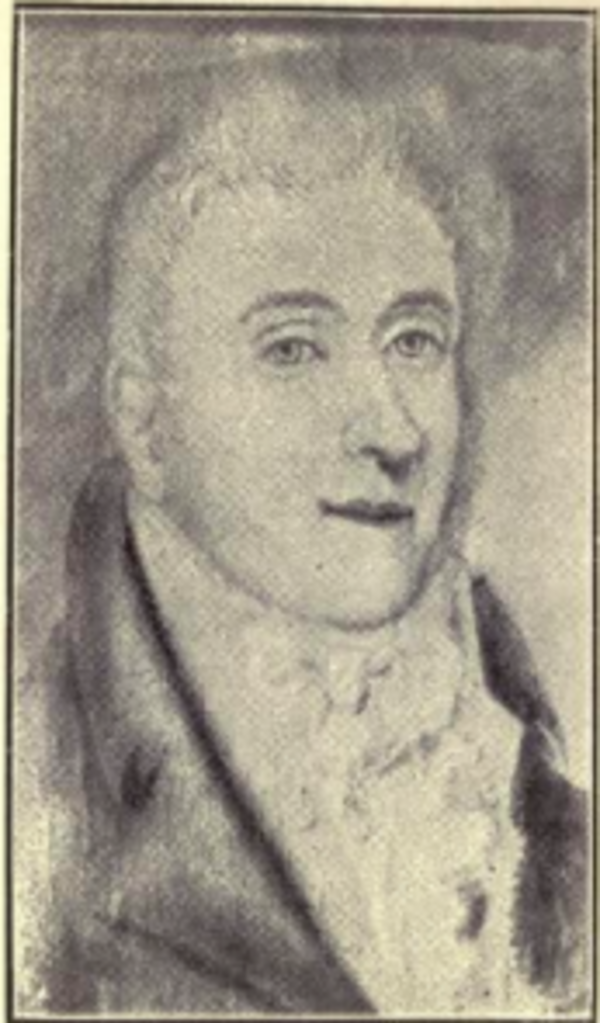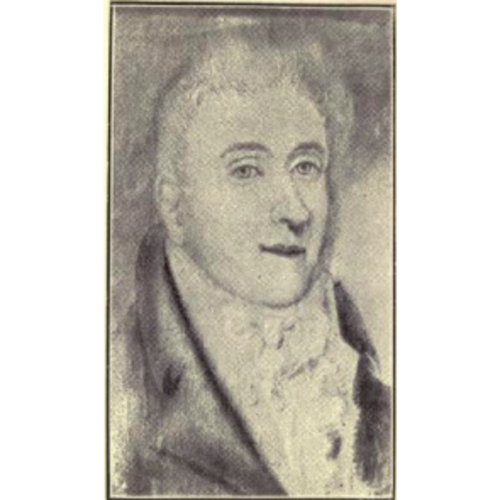
Source: Courtesy of Wikimedia Commons
HOLLAND, ANTHONY HENRY, printer, editor, and businessman; b. 25 Nov. 1785 in Halifax, eldest son of Matthias (Matthew) Holland, a soldier from Hesse-Kassel (Federal Republic of Germany), and Margaret Appledore; m. 22 Dec. 1816 Eliza Merkel in Halifax, and they had three children; d. 10 Oct. 1830 near Halifax.
Little is known about Anthony Henry Holland’s early years, but it is clear that he was given a sound basic education and that he was encouraged to develop independence, integrity, and a strong social conscience. The namesake and godson of Anthony Henry*, another German settler and the first king’s printer of Nova Scotia, he probably served his printer’s apprenticeship in Henry’s office. While in his early twenties Holland spent some time in the United States, at first apparently as an employee of William W. Clapp, publisher of the Gazette of Maine, Hancock and Washington Advertiser in Buckstown (Bucksport, Maine). In April 1811 Clapp sold the paper to Holland, who managed it for a year. He then announced a one-month suspension and about the same time, it seems, returned to Halifax.
Within six months of the outbreak of war with the United States in June 1812 Holland issued a prospectus for a newspaper to be entitled the Acadian Recorder. When the paper appeared on 16 Jan. 1813 it became the fourth in Halifax, its competitors being John Howe’s Nova-Scotia Royal Gazette, William Minns’s Weekly Chronicle, and John Howe Jr’s Halifax Journal. Unlike the other three, which generally avoided politics and were conservative in outlook, the Recorder intended from the start that “rational and fair discussion of political principles, and candid investigation of the characters of public men and public measures will never be rejected,” and under its young editor and publisher adopted a tone of moderate reform. Aided by public goodwill and wartime prosperity, the venture flourished under Holland’s able and energetic leadership and rapidly became one of the most significant journals in the province.
Although the Recorder had appeared under the banner of reform, the political climate dictated that any criticisms of the governing powers had to be made cautiously. Holland believed strongly in moderation and rational accommodation as a solution to most problems and rarely let his emotions override his common sense. On at least one occasion, however, he antagonized authority. In February 1818 the Recorder printed a satirical piece on Edward Mortimer*, a Halifax County mha. Mortimer promptly brought up the subject in the House of Assembly. Holland was forced to apologize and he was reprimanded by the speaker. Two years later he apparently printed a pamphlet by William Wilkie* which castigated the local magistrates and other government officials. When Wilkie was tried and sentenced to two years’ imprisonment, the Recorder agreed with the other Halifax papers that the punishment was deserved. Evidently Holland had decided that Wilkie’s cause could not be safely supported.
In spite of these problems, Holland was able to present some innovative features in the Recorder. In February 1817 it became the first paper to print the debates of the assembly on a regular basis. The following year it published a series of letters by Agricola (the pseudonym of John Young*) which aroused widespread interest with their criticisms of the state of farming in the province and their proposals for improvement. Then in 1821 it presented some satirical letters by Thomas McCulloch* on the reasons for Nova Scotia’s backwardness. Both series were related to the postwar economic depression and the need for improvement of the province’s prospects, a topic dear to Holland’s heart. In his editorial columns he supported the Halifax merchant community, which feared the potentially damaging effect of free trade on Nova Scotia. Like many Nova Scotians he admired the British character, constitution, and sense of freedom but was sometimes critical of the country’s leadership. In contrast, he distrusted the Americans and disliked republicanism, considering that the American idea of liberty bordered on licence and that their culture was inferior to that of Nova Scotia. In patriotic terms, however, Holland was probably more self-consciously Nova Scotian than either pro-British or anti-American. One of the original intentions of the Recorder was to make Nova Scotians proud of their heritage and potential and to publicize the beauties and resources of the colony abroad, and Holland never ceased to see a great future in agriculture, mining, and merchandising.
Besides his difficulties with authority, Holland had a long-standing feud with Edmund Ward*, the bellicose publisher of the conservative Free Press, founded in 1816. The two papers regularly abused one another in their editorial columns and the dispute turned violent when Ward was horsewhipped by John Young’s son George Renny* in 1820 and the next year assaulted by Holland’s brother Philip John. Although Ward was fined for libelling a Recorder contributor, he won his own suit against Philip John Holland, at which point a truce seems to have been called. In 1822 Holland added Philip John and a friend, Edward A. Moody, as partners, and two years later left the newspaper business to them. Philip John continued until 1836, when he sold the Recorder to Hugh William Blackadar* and John English. From 1814 Holland had also issued a yearly almanac, the Nova-Scotia calendar, which was carried on by his brother until 1832.
While operating the Recorder, Holland had decided to open a paper-mill when American suppliers were unable to meet his requirements for newsprint, and he continued to manage the mill after he had left publishing. The mill, the first in what is now Atlantic Canada, was in operation on Nine Mile River near Bedford Basin by 1819. It had two storeys, the upper one with its walls slatted in the manner of venetian blinds to permit the circulation of air to dry the paper. In addition to newsprint, Holland produced brown wrapping-paper to fill the needs of Halifax merchants. The local historian Thomas Beamish Akins* remembered that the newsprint was of poor quality, but the wrapping-paper was quite reasonable. Besides the mill, Holland was involved in a number of other business activities, about which little is known, including a lumbering business on Bedford Basin, a stationery store, and a snuff factory. He was also the owner of several rental properties in Halifax and on Bedford Basin and, like many others, possessed shares in the Shubenacadie Canal Company.
Gifted with above average intelligence and a “splendid physique,” Anthony Henry Holland was a man of independent thought and action and of sound judgement. As a newspaper publisher he thought of himself as a reformer who respected authority but refused to be intimidated by it, and he seemed to know intuitively what was possible without compromising his ideals or principles. To ensure that the Recorder was first with the highly prized foreign news he would row out to intercept a news packet even on stormy nights, while his competitors waited at the dockside the next morning. As a businessman he was honest and financially astute, taking only calculated risks. Socially he was friendly and outgoing, fond of entertaining and interested in cultural affairs. Unfortunately, his career as an active and influential Nova Scotian was cut short. He died on 10 Oct. 1830 following a driving accident. He was buried near his parents and their German friends in the graveyard of the little Dutch church in Halifax.
Halifax County Court of Probate (Halifax), Estate files, H135 (A. H. Holland) (mfm. at PANS). PANS, Churches, St George’s Anglican Church (Halifax), records of Dutch Church, reg. of baptisms, marriages, and burials; Map Coll., Shubenacadie, Grand Lake area, survey map, c. 1840; MG 5, 14; MG 9, no.1; no.41: 68; RG 20A, 48, 1813; 115, 1830. N.S., House of Assembly, Journal and proc., 1818: 30–31, 38. Acadian Recorder, 12 Dec. 1812 (prospectus); 22 Oct., 4 Dec. 1814; 27 Oct. 1821; 16 Oct. 1829. Sun (Halifax), 2 Sept. 1845. Weekly Chronicle, 27 Dec. 1816. Directory of N.S. MLAs. N.-S. calendar, 1814–32. G. E. N. Tratt, A survey and listing of Nova Scotia newspapers, 1752–1957, with particular reference to the period before 1867 (Halifax, 1979). George Mullane, Footprints around and about Bedford Basin (n.p., n.d.). Elsie Tolson, The captain, the colonel and me: Bedford, N.S. since 1503 (Sackville, N.B., 1979). Acadian Recorder, 16 Jan. 1888, supp.: 3; 16 Feb. 1913. Bedford-Sackville News (Lower Sackville, N.S.), 25 Sept. 1974. Chronicle (Halifax), 16 Dec. 1929. R. V. Harris, “In and about Halifax-notes of earliest times,” Acadiensis (Saint John, N.B.), 8 (1908): 23–28. D. C. Harvey, “Newspapers of Nova Scotia, 1840–1867,” CHR, 26 (1945): 279–301. Mail-Star (Halifax), 27 Jan. 1963: 7. J. S. Martell, “The press of the Maritime provinces in the 1830’s,” CHR, 19 (1938): 24–49. N.S., Provincial Museum and Science Library, Report (Halifax), 1931–32.
Cite This Article
Gertrude Tratt, “HOLLAND, ANTHONY HENRY,” in Dictionary of Canadian Biography, vol. 6, University of Toronto/Université Laval, 2003–, accessed December 19, 2025, https://www.biographi.ca/en/bio/holland_anthony_henry_6E.html.
The citation above shows the format for footnotes and endnotes according to the Chicago manual of style (16th edition). Information to be used in other citation formats:
| Permalink: | https://www.biographi.ca/en/bio/holland_anthony_henry_6E.html |
| Author of Article: | Gertrude Tratt |
| Title of Article: | HOLLAND, ANTHONY HENRY |
| Publication Name: | Dictionary of Canadian Biography, vol. 6 |
| Publisher: | University of Toronto/Université Laval |
| Year of publication: | 1987 |
| Year of revision: | 1987 |
| Access Date: | December 19, 2025 |



